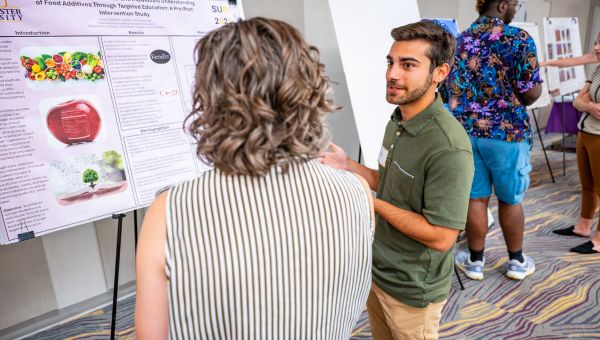Celebrating Student Research at SURI Closing Ceremony
Ethan Farkouh examines college students’ knowledge of and misconceptions about food ingredients and additives
 The closing ceremony for the Summer Undergraduate Research Institute (SURI) took place
on July 9, giving more than 30 students the opportunity to share what they discovered
through their own research in the five-week program alongside each of their faculty
mentors.
The closing ceremony for the Summer Undergraduate Research Institute (SURI) took place
on July 9, giving more than 30 students the opportunity to share what they discovered
through their own research in the five-week program alongside each of their faculty
mentors.
Senior Ethan Farkouh, a major in interdisciplinary studies with minors in nutrition and chemistry, reflected on his positive experience: “Everyone came in with different ideas and passions, and it made the whole experience way more meaningful. I learned a lot from the project, but the connections and conversations are what will stick with me the most.”
Farkouh investigated the additives in food and how well college students understand them through his SURI project. By doing so, he strives to clarify common misconceptions and misinformation surrounding food ingredients and labeling. Farkouh is being mentored by Dr. Amir Golmohamadi, nutrition professor, who believes that this research is important right now.
“This topic combines my interests in food science, public health, and consumer behavior,” Farkouh said. “I've always been interested in what goes into our food and how much the general public really knows about ingredients, particularly food additives. I thought it was critical to investigate how focused education could raise awareness and assist people in making better decisions in light of the growing popularity of clean label products and the abundance of contradicting information available online.”
Working under the guidance of Dr. Golmohamadi, Farkouh developed a study using a pre- and post-survey model. Participants first complete a short survey about their current knowledge of food additives. Then, they engage with an educational brochure and presentation created by Farkouh, and finally take a follow-up survey to see what they’ve learned.
“The issue is often a lack of accessible, science-based information,” Farkouh explained. “My objective is to dispel misunderstandings and help students understand the difference between natural and synthetic ingredients, as well as the rise of ‘clean labeling,’ which sometimes puts marketing ahead of transparency.”
Dr. Golmohamadi emphasized the importance of this research for college students. “College students are at a critical stage in their lives where they are forming enduring routines and making their own eating decisions for the first time,” he said. “Unfortunately, a lot of people don’t know what’s in the food they eat, especially when it comes to food additives. This information is particularly crucial at a time when marketing buzzwords like ‘natural’ or ‘clean’ can be deceptive if used out of context.”
Farkouh has noticed that even among educated populations like college students, there’s confusion. “There is a great deal of misunderstanding about food additives… regarding what they are, what they do, and how to distinguish between ‘natural’ and ‘synthetic’ on labels,” he said. “Although a lot of students are interested in clean eating, they may not necessarily know what it means in terms of the actual elements of food. This demonstrates the importance of clear, correct education.”
While past studies have looked at general nutrition education and label reading, Farkouh’s research stands out by focusing specifically on food additives and the concept of clean labeling. The student-led nature of the project and targeted structure gives it a fresh, relatable approach for a college audience. Dr. Golmohamadi explained that what separates this research even more is its use of a pre/post intervention design to measure actual changes in knowledge, along with its focus on college students, a group rarely surveyed in this kind of research.
For Farkouh, the SURI experience has also been a step forward in his academic journey. “SURI has been an excellent chance to start doing independent research while honing my abilities in data collecting, study design, and scientific communication,” he said. “I've gained experience that will help me achieve my objective of earning a master’s degree in food science. In addition to getting me ready for graduate-level research, finishing this project is strengthening my foundation in consumer-focused work and nutrition education, two areas I intend to continue pursuing in my future.”
He hopes to survey at least 25 to 30 additional students by the end of the summer and sees this research as just the beginning. “When people are given reliable information, they’re more likely to read labels carefully, ask the right questions, and make choices that match their values and health goals.”
Ultimately, he and Dr. Golmohamadi hopes the project sparks more conversation — not just about food additives, but about transparency in the food industry as a whole.
